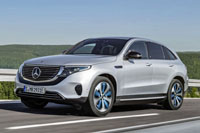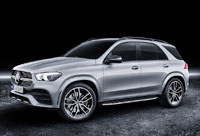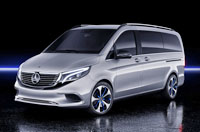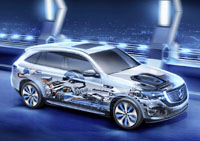
Mercedes-Benz plans to have a carbon-neutral new model lineup within just 20 years, this 2039 date being touted as extremely aggressive compared to its luxury sector peers.
It already offers a considerable fleet of environmentally-conscious Mercedes-Benz models, such as the 48-volt hybrid EQ-Boost CLS, E-Class Coupe, E-Class Cabriolet and upcoming GLE 580 4MATIC, plug-in hybrid models like the GLC 350e 4MATIC, S560e, and others, plus it will follow up on these shortly with the all-electric EQC mid-size crossover luxury SUV, as well as a smaller compact BEV based on the 2018 Concept EQA, so expanding the lineup doesn’t seem to be too far fetched.
Mercedes calls the new plan Ambition2039, but nine years before that date it’s still targeting 50 percent of its new vehicles to be electrified, with this lineup comprised of hybrid, plug-in hybrid, and 100-percent plug-in electric vehicles.

“Let’s be clear what this means for us: a fundamental transformation of our company within less than three product cycles,” said Ola Källenius, Chairman of the Board of Management of Daimler AG, and head of Mercedes-Benz Cars since the mantle was passed over to him by his predecessor, Dieter Zetsche on May 22nd, 2019. “That’s not much time when you consider that fossil fuels have dominated our business since the invention of the car by Carl Benz and Gottlieb Daimler some 130 years ago. But as a company founded by engineers, we believe technology can also help to engineer a better future.”
It was only last year that Mercedes committed to electrifying its entire new vehicle lineup with a sizeable investment of $11.7 billion USD ($15.8 billion CAD), adding a promise to initially build more than 10 BEVs, before its entire range gets electrified.
Ahead of achieving this inspirational target, Källenius promised to work with all Mercedes partners in a holistic effort to reduce electric vehicle production costs and make improvements to the range and performance of its EV lineup, while the German automaker also promises to add more EV powertrains to its commercial vans, trucks, and buses.

What’s more, Mercedes plans to continue investing in alternative technologies such as fuel cells, which it uses already in its GLC F-CELL, a world-first that combines a fuel-cell and plug-in battery within the powertrain, and plans to incorporate within larger commercial applications such as urban-use buses.
This said, take its new car lineup to new carbon-neutral heights only deals with part of the problem, the other area needing carbon neutrality being the production process. Fortunately Mercedes is well on the way to greening its assembly plants, being that it already puts renewable energies to use in its Sindelfingen, Germany based Factory 56, the result being a CO2 neutral facility.
“In ‘Factory 56’, we are consistently implementing innovative technologies and processes across the board according to the key terms ‘digital, flexible, green’,” commented Markus Schäfer, Member of the Divisional Board Mercedes-Benz Cars, Production and Supply Chain. “We create a modern workspace with more attention to individual requirements of our employees. All in all, in ‘Factory 56’ we are significantly increasing flexibility and efficiency in comparison to our current vehicle assembly halls – and of course without sacrificing our top quality. In this way we are setting a new benchmark in the global automotive industry.”

Mercedes also added that every European factory would be carbon-neutral by 2022, highlighting its engine factory in Jawor, Poland that’s already an example of greater environmental and economical efficiencies, thanks to its comprehensive renewable energy usage.
Additionally, the Mercedes is changing from a value chain to a value cycle, the automaker citing a Mercedes lineup that already achieves a potential-recycling ratio of 85 percent. Daimler will also use its experience to help each of its suppliers reduce their carbon footprint.
“We prefer doing what our founders have done: They became system architects of a new mobility without horses,” stated Källenius. “Today, our task is individual mobility without emissions. As a company founded by engineers, we believe technology can also help to engineer a better future.”
Story credits: Trevor Hofmann
Photo credits: Mercedes-Benz
